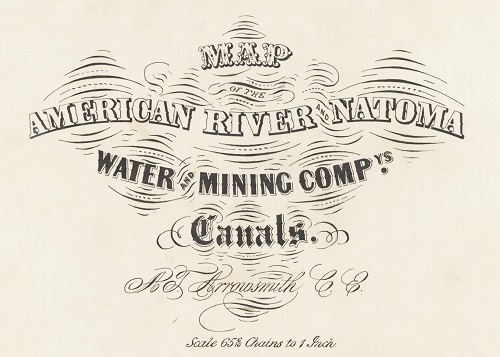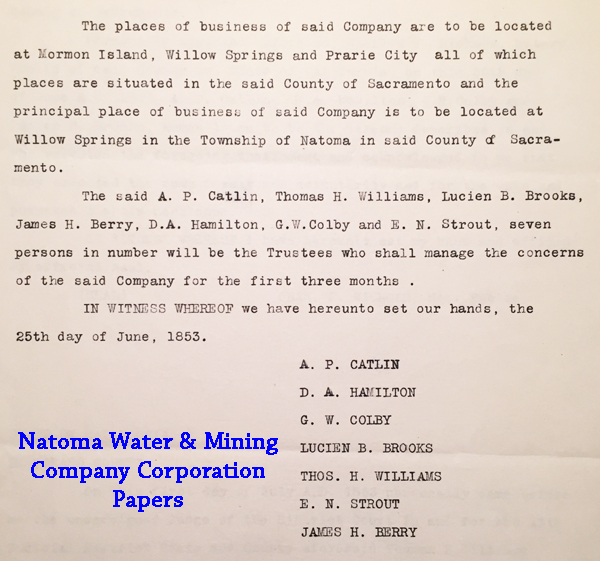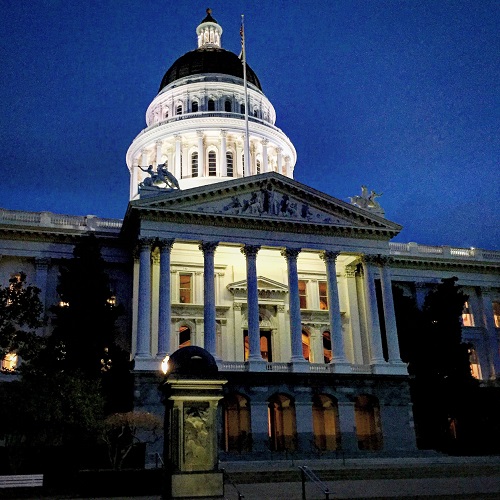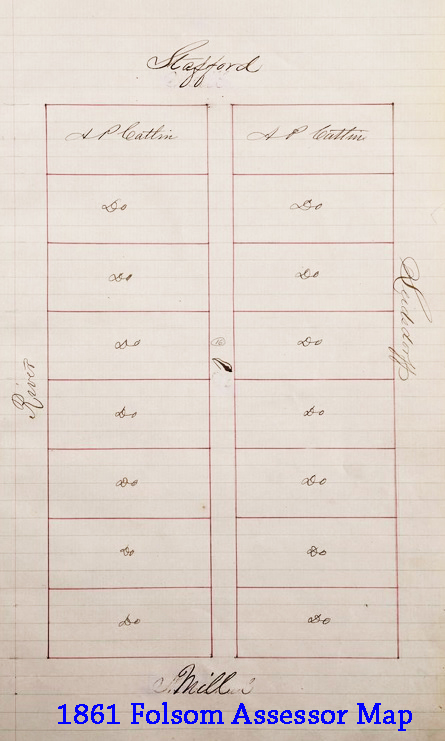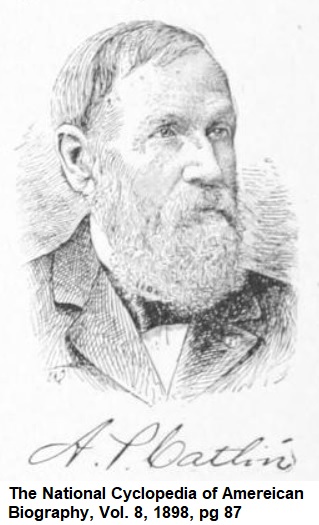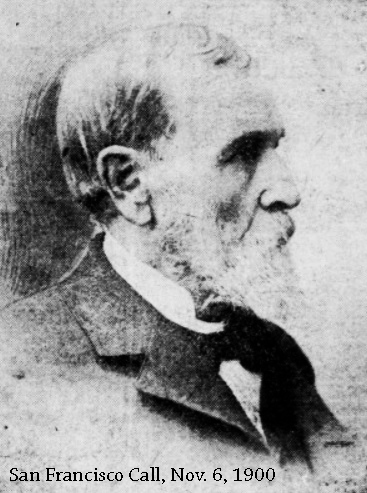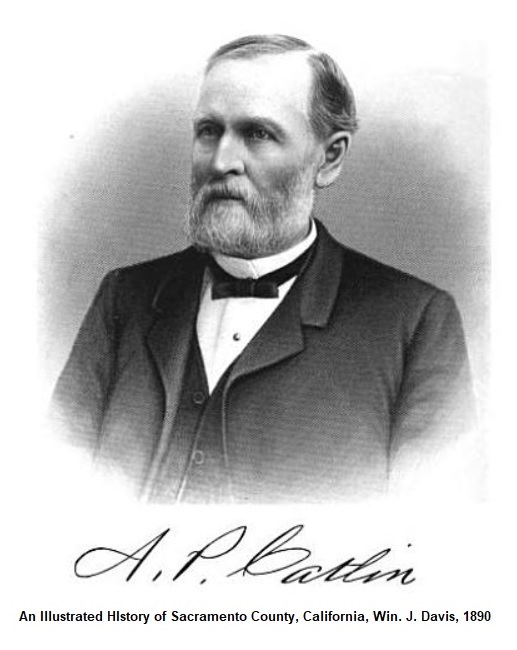
Amos P. Catlin is a forgotten California pioneer who had a major role in putting Sacramento on the map. His legacy goes far beyond just sponsoring and fighting for his Senate bill in 1854 to permanently move California’s capitol to Sacramento.
Before he was even elected to the legislature, Catlin, as an 1849 gold miner, organized companies that would build the Natoma Canal and the North Fork Ditch along the south and north forks of the American River. These two water works projects, originally intended for mining and agricultural purposes, have helped shape and grow the surrounding communities of Folsom, Orangevale, Citrus Heights, and south Placer County.
A. P. Catlin: ’49er, Gold Miner, Lawyer, Judge
As a lawyer, Catlin would become a well-respected legal mind and ultimately be elected a Superior Court Judge in Sacramento County. He was often hired by both the City of Sacramento and Sacramento County for legal consultation and to represent them in different law suits.
Mr. Catlin had claims upon the party that should not be over looked. Amos P. Catlin is an up-right, high-minded man — one who, as a lawyer had some equals and few superiors, and should have been upon the bench years ago. In Legislature at Benicia, in 1854, Mr. Catlin labored for the bill locating the State Capitol in this city, and its passage was largely due to his labors.
Attorney George Blanchard seconding the nomination of Catlin for Superior Court Judge at the Sacramento County Republican Convention, 1890. (1890 Sacramento Daily Union, Volume 79, Number 130, 25 July 1890)
While doing research for my biography of Benjamin Bugbey, Catlin’s name popped up again and again with respect to water canals, railroads, the Leidesdorff land grant, and the politics of Sacramento County. Additional research on Catlin has revealed a fascinating man who called Sacramento home. Even though he is largely lost to history, his legal finger prints were all over the development of Sacramento City and County in the 19th century.
To the Honorable Board of the Trustees of the City of Sacramento: ln response to your request for my opinion as to the constitutional validity and binding force of the anti-Chinese ordinance proposed on the 11th instant, for your consideration by a committee of an anti-Chinese association, I have to say : That said ordinance is a self-manifest and palpable violation of the Federal Constitution, in that it is aimed to excluded from the city of Sacramento all persons of a certain nationality; that is to say, all Chinese, without regard to age, sex, occupation, or other condition. To some minds this does not perhaps appear so apparent. But to the same minds, if an ordinance were framed, with a whereas even more verbose and extended than this in recitation of supposed evils, followed by a section making it a misdemeanor, punishable by fine and imprisonment for any Italian, Mexican, or Portuguese to reside in or remain within the limits of the city after a specific time, it would at once become perfectly clear that the Federal Constitution (State Constitution and laws to the contrary notwithstanding) does not tolerate, but forbids such class legislation.
Letter to Sacramento City Trustees in 1886 from A. P. Catlin (1886 Sacramento Daily Union, Volume 54, Number 126, 18 January 1886)
The timeline of his life below only begins to scratch the surface of Catlin’s life. He is the subject of my next book. Because he was prominent a public figure, there are many newspaper stories written about his activities in the Sacramento region. Some of his papers and correspondence are at the Bancroft Library and California State Archives that I will be reviewing. If you have any information about Amos P. Catlin – photos, letters, legal documents, etc. – please contact me as I would eager to review them.
- Catlin’s Defense of the Gold Run mining debris trial of 1881
- The Railroad that broke Auburn and how Catlin saved the Town
- Murder in French, Catlin defends Folsom man accused of killing his wife
- Catlin Defends Hydraulic Mining Company, Highlights Sacramento’s Horrible Sewer System
- How Catlin fought in 1854 to move California’s Capitol to Sacramento
- Judge Catlin finds Sacramento Bee guilty of libel, C. K. McClatchy for contempt of court
- Catlin’s Mormon Island letters to his father in New York
- Catlin Leads Impeachment of California Treasurer
- “The Chinese Must Go” Catlin’s legal opinion that stopped the eviction of Chinese from Sacramento
- Letters from Amos Catlin’s Ocean Voyage to California in 1849
- The map fight over the Leidesdorff land grant
- The 1898 lawsuit that settled the San Juan Water District water rights
- The Map Fight over Rio de Los Americanos Rancho Land Grant
- Letters From The 1849 Ocean Voyage to California by Amos Catlin
- Letters From 1850 Of A Mormon Island Gold Swindle
- A Wife’s Letter Searching for Dr. John M. Vaughan in Sacramento, 1850
- J. Neely Johnson Invites Amos Catlin To The Sacramento Valley Railroad
The book: Amos P. Catlin, The Whig Who Put Sacramento On The Map
Amos P. Catlin Timeline
- 1823, January 25: Born in Red Hook, New York
- 1844 Admitted to the New York bar to practice law
- 1849 Sailed to California, arrived in San Francisco, then made his way to Mormon Island gold mining region on the South Fork of the American River.
- 1850 Chairman of the Whig Party at Mormon Island.
- 1851 Nominated as a candidate for Assembly as a Whig, loses in the general election
- 1851 Begins construction on a sawmill at Shingle Springs
- 1851 Attends Mining Convention to help set up rules governing mining claims
- 1851 Forms the Natoma Water Company and is selected its President. The company would build the Natoma water canal from Salmon Falls down the town of Folsom and beyond.
- 1852 Nominated for a Senate seat from the Whig Party, wins in the general election
- 1853 Catlin appointed as director on the Sacramento Valley Railroad corporation
- 1854 Catlin introduces bill to permanently move the State Capital from Benicia to Sacramento. The bill finally passes the Senate in February. It was passed by the Assembly and signed by the Governor. The first official and permanent meeting of the legislature in Sacramento occurred on March 4, 1854
- 1854 Elected as the president of the American River Water and Mining Company that would go on to construct the North Fork Ditch along the North Fork of the American River.
- 1855 Leaves the Whig Party and becomes part of the American Party, which is the formal pollical body of the Know Nothing Party.
- 1856 Nominated for an Assembly seat at the American Party Convention and wins in the general election.
- 1856 – 1857 Buys several blocks in the new town of Folsom and purchases over 9,000 acres of the Leidedorff land grant for the Natoma Water and Mining Company.
- 1857 Leads an Assembly investigation into corrupt practices at the State Treasurer’s office. He then leads impeachment trial in the Senate of the Treasurer Bates, who resigned.
- 1857 Becomes Chairman of the State Central Committee for the American Party.
- 1858 Elected as a director for the California Central Railroad company
- 1858 Board member of the Folsom Literary Institute.
- 1858 Invests in the California Central Railroad, buys lots in town of Lincoln, works with Theodore Judah on the American River Railroad.
- 1858 After the collapse of the American Party, Catlin aligns himself with the Independent Party and become the Sacramento County President of the organization.
- 1859 No longer in the Assembly, he focuses more of his time and energy practicing law in Sacramento County as defense and probate attorney.
- 1860 Appointed to a committee to consider the consolidation of Sacramento City and County.
- 1860 Marries Ruth Donaldson in Folsom.
- 1862 Original map of the Leidesdorff land grant is contested, imperiling Amos’ and other buyers of real estate from the Folsom Estate.
- 1863 Travels to Washington D. C. to argue on behalf of the Folsom Estate for the original Leidesdorff land grant map.
- 1864 U. S. Supreme Court rules in his favor. He also visits Gettysburg and would display artifacts from the battle the following year at Pioneer Society meetings.
- 1864 Donates Folsom lots to the Episcopal Church for the erection of a church.
- 1865 Becomes active in the Union Party. But the Union Party suffers a terrific schism splitting it into two competing political parties. He is nominated for Assembly, but loses to the other Union Party candidate from Folsom P. J. Hopper.
- 1865, October 5th, his first child, a daughter is born in Folsom.
- 1865 Forms a law partnership with G. W. Bowie and becomes the lead agent in selling the Leidesdorff ranch land to the public.
- 1865 Employed by the Sacramento Union as a political editor until 1867
- 1867 Becomes president of the Anti-Low Union Party in Sacramento County. Nominated for Sacramento County District Attorney, but does not win.
- 1866 death of first born daughter, Emily.
- 1867, Twin infants die on the day of their birth
- 1868 Joins the Republican Party, reluctantly
- 1869 The Catlin family has moved to Sacramento and has a son, Alexander.
- 1869 Runs for a Sixth Judicial District Court Judge position that encompasses Sacramento and Yolo counties, does not win.
- 1870 Form new law partnership with T. B. McFarland. Catlin continues to argue numerous cases before the California Supreme Court.
- 1871 Birth of son John
- 1872 Appointed to the State Board of Equalization by Governor Newton Booth.
- 1872 Board of Equalization issues several controversial instructions to county tax equalization boards.
- 1873 Birth of a daughter Ruth, May 26
- 1873 Being dissatisfied with the way the county Republican Party is being managed, he organizes the Independent Taxpayer’s Party.
- 1874 California Supreme Court rules that the State Board of Equalization has no right to set or fix tax rates, only the legislature has that power.
- 1874 Successfully defends the Sacramento Union in a libel law suit ostensibly brought by the Central Pacific Railroad regarding reporting on mishandling of election returns for a candidate favorable to the CPRR.
- 1875 Catlin and McFarland dissolve law partnership.
- 1875 Birth of son Harry
- 1875 Placed in nomination for Governor at the statewide Independent Taxpayer’s Party but loses the nomination to John Bidwell.
- 1875 Nominated for Sixth Judicial Court Judge over J. H. McKune, but he loses in the general election.
- 1876 With the collapse of the Independent Taxpayer’s Party at the last election, he goes back to identifying as a Republican and speaking at their events
- 1877 Represents farmer George Atkinson in a law suit brought for damages from the debris flow from the Sacramento and Amador Canal Company and associated hydraulic mining. Catlin helps win a $4,000 damages award.
- 1878 Ruth Catlin, Amos’ wife, dies in Sacramento
- 1878 Declines to be nominated as delegate to the Citizen’s Convention to form a new California state constitution
- 1878 Begins work with the City of Sacramento, a relationship of representation and consultation that would last for several years.
- 1879 Nominated by the Republican Party as a candidate for Associate Justice of the California Supreme Court under the court’s expansion under the new state constitution. He does not campaign and does not win.
- 1880 Represents Francois Lamblett in a sensational murder case of his wife in Folsom. Francois is acquitted.
- 1881 Begins representing and consulting for the Sacramento County Board of Supervisors
- 1881 Organizes a Citizens Convention to nominate and elect non-partisan men to City of Sacramento offices.
- 1881 One of many attorneys representing the Gold Run Ditch Company in a law suit brought by the City of Sacramento over hydraulic mining debris filling the Sacramento and American rivers.
- 1884 Helps organize the Electric Light Company in Sacramento and is one of the board directors.
- 1885 Represents City of Sacramento in negotiating the transfer of property from Mrs. E.B. Crocker to Sacramento City to establish the Crocker Art Gallery.
- 1886 Despite his opposition to Chinese immigration, he strongly counsels the City of Sacramento against passing an ordinance to remove all Chinese people from the city limits.
- 1886 Purchases large grazing property with C. L. Wilson in Butte County.
- 1887 Works with the town of Auburn to pay on old Sacramento, Placer, & Nevada Railroad bonds so they can reincorporate as a city again.
- 1889 Elected to the Executive Committee of the State Bar Association
- 1890 Successfully represents the City of Sacramento in a Supreme Court case that saves the city from having to pay $400,000 to bondholders.
- 1890 Represent Folsom Power and Light before the County Board of Supervisors requesting certain streets be permanently close for the construction of a water canal from the dam by the state prison to a power house on the American River.
- 1890 Nominated by the Republican County Convention for Superior Court Judge, also endorsed by the Democrats and Independent Citizen’s Party…this time Catlin wins
- 1894 Judge Catlin finds Sacramento Bee guilty of libel and awards $500 compensatory damages to the plaintiff.
- 1896 Finds C. K. McClatchy, editor of the Sacramento Bee, in contempt of court for publishing erroneous divorce proceedings, and levies a $500 fine.
- 1896 Defeated in his re-election bid for Superior Court Judge
- 1898 Represents the large estate of Solomon Runyon
- 1900, November 5, Amos P. Catlin dies in Sacramento at his home.
Catlin was a political editor for the Sacramento Daily Union from September 1864 to April 1865. Even after he left the newspapers employment, he wrote other pieces for them. It is often mentioned that Catlin is the author of the July 6, 1867 article titled End of a Tyrant about the execution of Maximilian I in Mexico. Because there is no attribution in the paper or the author, I must take the others attributing the story to Catlin as fact. The succinct editorial was supposedly reproduced through many parts of Latin America. Below is the text of the article.
Sacramento Daily Union, Volume 33, Number 5077, 6 July 1867
THE END OF A TRYANT.
There seems to be no question of the authenticity of the intelligence which reached us a few days ago, announcing the tragic end of the tyrant who, for about four years, has lorded over Mexico. He fell into the hands of the republican forces at the surrender of Queretaro, and, after summary trial by a Court-martial, was sentenced to death, and by the orders of Juarez was shot on the I0th of June. He shared the fate which so many of his class deserve and which not a few of them have received.
The enormity of the crime thus expiated will scarcely be comprehended by the present generation of men, either in Europe or America — in the former, because there was too much complicity there in the crime itself; and in the latter, because the public sense has been blunted by a nearer contemplation of other enormities equally repulsive and shocking. History, moreover, views great events from an eminence, and through the medium of a clearer light than is vouchsafed to the actors in the stirring and confused scenes which time and philosophic truthfulness resolve into consistency and order.
Upon the historic page the career of Maximilian will make a striking episode. No parallel to it will be found in the record of any usurper that ever risked his head to wear a crown. The most selfish, the most brutal, the most sanguinary have had their apologists and defenders; some claim, growing out of unrepaired wrongs, or some semblance of inheritable right exhumed from the dusty records of the past, could be found with which to supply a motive more or less defensible. But Maximilian’s case stands upon the naked ground of an invader, without the shadow of a justifying or excusable cause. He had not even the robber’s plea, that might makes right.
He had neither men nor money of his own to carry on the wicked enterprise, but used the mercenaries furnished him by a brother in the cause of spoliation and robbery. An antipode and an alien in the most extended sense to Mexico, its form of government and its traditions, no conceivable motive can be ascribed to him but the lust of power — the hankering after a crown. He assumed the airs of a philanthropist, and professed that the social order which a despotism enforced were better for the Mexican people than the republican confusion in which they were involved; and in order to give effect to these favorite dogmas of kingcraft and priestcraft, he deluged hail a continent in blood and confiscated the estates of all who opposed him.
He came as a royal missionary to introduce European civilization where it was falsely alleged a semi-barbarism existed ; and his instruments were the bayonets of a band of trained African savages, and an army of French soldiers employed without mercy upon the common people, while the halter and the scourge were relied upon to subdue men and women of distinction.
His armies devastated the fairest fields in Mexico, and his rule of warfare against the inhabitants who resisted was such as our Government does not feel authorized to practice against the merciless savages. His edicts denied to the patriots who bore arms against him the privileges of honorable warfare, and thereby turned his prisoners over to indiscriminate slaughter. In this mad career he persisted after his allies had deserted him, and was only stopped when his own blood sank into the soil saturated with that of thousands of his victims.
The wisdom of the act of Juarez in permitting the ax of justice to fall upon the neck of so illustrious a subject has been questioned by some who, we apprehend, do not sufficiently appreciate the importance of always maintaining an erect and resolute front against the pretensions of royalty. The contest in Mexico is yet between republicanism and imperialism. The weight of this royal name, the odor of sanctity which surrounds the person of a Caesar, the divinity which doth hedge a king, were so many forces marshalled against Juarez in his struggle.
To have spared Maximilian because he was the brother of the Emperor of Austria and protege of Napoleon would have been to acknowledge a principle always active hostility to republicanism in Mexico. But more practical reasons than these not only justify the act, but make it clear that Juarez would have shown himself unequal to bis position if he had faltered in so plain a duty. The public voice of Mexico demanded it, and a refusal on his part would have weakened his own authority, now so needful in reconstructing a shattered Government.
Besides, it was a necessary blow, in order to destroy the Imperial party. With Maximilian retired to Europe, a sew plot to establish an empire in Mexico could be worked out at leisure. While the hope of restoration existed there would be enough material in the Mexican element for it to work upon, and traitors would be found in the bosom of the republic as long as a banished Emperor lived to nourish them.
Juarez has proved himself a statesman in his past career, and has not acted in this important affair without a full consideration of the subject in all its probable bearings. There are none in Europe that will care to resent the death of Maximilian except Napoleon and Francis Joseph, and neither of these can afford to undertake a war against Mexico for such a cause. Juarez has but vindicated the Monroe doctrine, and that, is a principle for which the United States can now afford to fight. When that question again comes up for diplomatic discussion, our Government will not have the Southern Confederacy at its throat choking its utterance, but it will be free handed, and willing to defend itself, and its neighbor it needful, against the next effort at Imperial propagandism on this continent.
